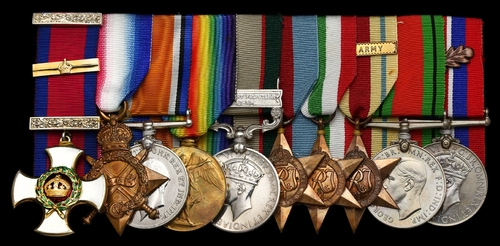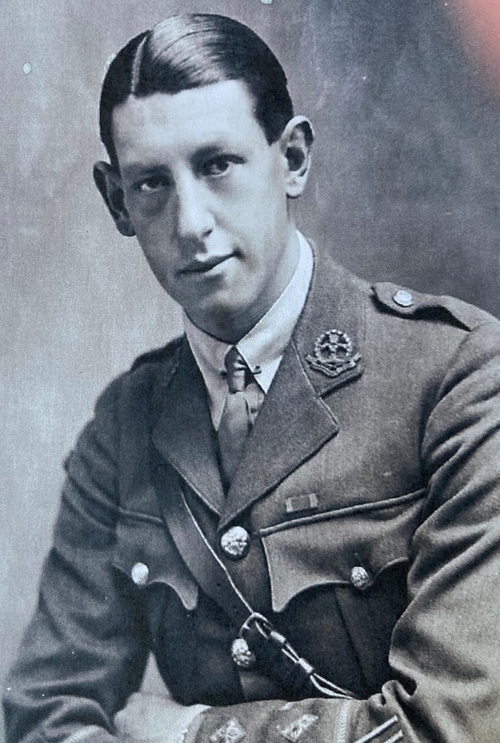Auction: 25003 - Orders, Decorations and Medals
Lot: 188
The rare Great War and Second World War D.S.O. and Bar group of ten awarded to Hon. Colonel A. C. Taylor, Indian Army, late London Rifle Brigade and Middlesex Regiment
Having been awarded the D.S.O. for his courage as an 18-year-old subaltern at Pozières on the Somme in the summer of 1916 - a rare honour indeed for a such a junior officer - he added a Bar for like deeds south of Mersa Matruh in June 1942, when he led the 3rd Battalion, 10th Baluchis in two uphill assaults
Distinguished Service Order, G.V.R., with Second Award Bar, the reverse of the Bar officially dated '1942'; 1914-15 Star (1649 Pte. A. C. Taylor, 5-Lond. R.); British War Medal 1914-20 (Capt. A. C. Taylor); Victory Medal 1914-19 (Lieut. A. C. Taylor); India General Service 1936-39, 1 clasp, North West Frontier 1937-39 (Maj. A. C. Taylor, 3-10 Baluch R.); 1939-45 Star; Africa Star, copy clasp, 8th Army; Defence and War Medals 1939-45, the central surround wreaths on the D.S.O. somewhat chipped, otherwise very fine and better (10)
D.S.O. London Gazette 26 September 1916:
'For conspicuous gallantry in action. Seeing a large number of men of another unit who had lost their bearings, he went out, and finding that they had lost their officers, re-organised them, directed them where to dig-in, and thus enabled the ground to be held. Later he did other fine work.'
Bar to D.S.O. London Gazette 24 September 1942:
'In recognition of gallant and distinguished services in the Middle East.'
The original recommendation states:
'On 27 June 1942, in the face of considerable opposition, Lieutenant-Colonel Taylor, commanding 3-10th Baluch Regiment, gained a footing on the escarpment in square 7232 south of Matruh, thus drawing enemy forces onto himself for the benefit of others.
The enemy reinforced his troops in this area but, in spite of this, on the night of 27-28 June, Lieutenant-Colonel Taylor again forced his way up the escarpment with his battalion, broke through the enemy line and succeeded in extricating most of his column.
Throughout this operation, Lieutenant-Colonel Taylor showed considerable drive, resource, tactical skill, and coolness under fire.'
Arthur Charles Taylor was born in Epsom, Surrey on 11 October 1897 and was educated at Christ's College, Finchley. One of Baden-Powell's first scouts, he enlisted in the 5th Battalion, London Regiment - the London Rifle Brigade - and served in that capacity in France and Flanders from September 1915.
Subsequently commissioned as a 2nd Lieutenant in the 11th Battalion, Middlesex Regiment in November 1915, he was just 18 years old on the occasion of his D.S.O.-winning exploits at Pozières in late July 1916. The battalion had moved up to the frontline on the 3rd, where they confronted grim scenes:
'The Battalion now had its first sight of No Man's Land, and it was truly a horrible spectacle. Dead bodies were everywhere, and many poor fellows, who had been lying out wounded in that terrible space of dead ground between the opposing trenches, were brought in. At intervals the guns on both sides were active. One officer - 2nd Lieutenant D. G. Gilfillan - and six other ranks were wounded during the day.' (Everard's history, refers).
Such scenes were to become common place over the coming weeks, as the 11th Battalion fought in several costly actions, Taylor adding a 'mention' to his accolades in the process (London Gazette 4 January 1917, refers).
In September 1918, he transferred as a Lieutenant to the Indian Army with an appointment in the 127th Baluch Infantry.
The regiment having then been re-designated as the 10th Baluchis, he was advanced to Major in the 3rd Battalion in October 1934 and witnessed active service on the North-West Frontier at the end of the decade. But it was for his leadership of 3-10 Baluchis in the 4th Indian Division in North Africa that he was awarded his second D.S.O., the above cited deeds being enacted in the withdrawal from Mersa Matruh, following the fall of Tobruk.
The battalion had arrived at Basra, Iraq in August 1941, from whence it departed for Egypt at the year's end. Having then joined the 38th Indian Infantry Brigade, on the line of communication between Mersa Matruh and El Alamein, Taylor and his men moved to Tobruk in January 1942. A brief period of rest ensued in Palestine but the battalion was back in the Western Desert by June 1942. Here, then, the juncture at which he distinguished himself south of Mersa Matruh at the end of the month.
Advanced to the substantive Lieutenant-Colonel in July 1942, he does not appear to have joined the battalion on its subsequent deployment to Sicily and Italy. His final appointment was as Inspector of Physical Training for G.H.Q., India and he proceeded to the U.K. on release leave in November 1946, retiring with the rank of Honorary Colonel; sold with copied research.
Subject to 20% VAT on Buyer’s Premium. For more information please view Terms and Conditions for Buyers.
Sold for
£5,500
Starting price
£2800







